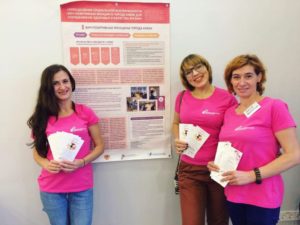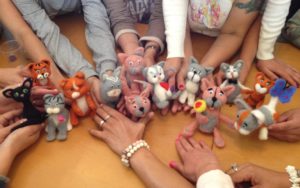Author: Yana Kazmirenko, Ukraine

Members of “Kyianka+” self-help group conduct regular meetings to exchange positive emotions, share success stories and learn how to resist psychological abuse.
Vera Varyga, leader and founder of the “Kyianka+” self-help group for women living with HIV, receives at least three anonymous phone calls a day to their hotline phone number +38 (067) 239 69 36 from women who have just learned about their HIV status. This hotline number is promoted at the HIV testing locations. Vera’s words may have a significant influence on the future lives of these women and their ability to accept their status and move on.
“Kyianka+” group, operating with support from ICF “AIDS Foundation East-West” (AFEW-Ukraine), was created three years ago, and has already helped more than 150 women. Women living with HIV attend monthly meetings, participate in master classes and get psychological counselling.
“It was very difficult for me to accept my HIV status. I received my first psychological assistance from another woman living with HIV only two years after I was diagnosed. During my first self-help group session, I cried a lot, but women supported me, believed in me and showed me that I am not an outcast. Now, in my groups, I see other girls crying like I was,” says Vera.
In the district hospital of Kharkiv region, Vera had to deal with cruel and unfriendly attitude from staff, which was typical of the Ukrainian provincial medical facilities back in the early 2000s. People diagnosed with HIV were perceived as socially dangerous elements, almost criminals.
Today Vera is a role model – a self-assured woman, a mother of two healthy boys, a beloved wife. She is very friendly, laughs a lot and loves her coral lipstick.
Difficulty of disclosure
At “Kyianka+” sessions, women share their concerns and success stories, trying to find their own way to get on with their lives.
“For example, we conduct role plays during which we model HIV-status disclosure to different people: mothers, partners, children, bosses or health workers. Mothers usually face the most difficult task of telling their sons or daughters about their status. Preparation for such disclosure takes more than a year, and we recommend having a psychologist present: it is hard for a mother not to burst out crying in such a situation,” Vera explains.
Vera is proud of the atmosphere in her group: all the girls get along well, not least because of the set of rules that they developed together:
- Confidentiality: nothing discussed in the group can be shared outside of the group.
- Attendance is not allowed for women who currently use drugs – they have other values. If they succeed in quitting – they are always welcome.
- No criticizing: all women are free to express their opinions.
- No medical advice or recommendations: treatment can only be prescribed by a doctor.
- The group is for mutual support: you get help and you give help.
All responsibility is on her
Men and women react differently when they hear about HIV-positive status. Men usually need a clear plan, while women often feel panic and become depressed. In our culture, the challenges of solving health problems and thinking about the future of the family often fall upon women.
“Our task is to teach a woman to love and respect herself, to find time for treatment and to make her health a priority. It is like an emergency situation in a plane: first put on your mask, and then put a mask on your child,” Vera says.
Traditions are another area of concern for Ukrainian women: what will the parents say? How will children, neighbours, colleagues react? Is my husband going to leave me? Women have to deal with stigma: everything they had thought about HIV before becomes part of their personal story.
Teaching to share and to help
Anna Lilina, a 30-year-old woman from Kyiv, was diagnosed with HIV when she was three months’ pregnant. Doctors’ prescriptions saved her daughter from getting HIV. Back in the municipal AIDS Center, Anna learned about the self-help group, but she only went there later, when in trouble. She and her daughter were thrown on the street by her boyfriend, whom she had met at the hospital.

“My relatives gave me money to pay for the first and last months of the apartment rent. He suggested I moved in with him and spent the money to renovate his house and fix his car. When the money was gone, he forced me out into the street in winter,” Anna says.
Anna needed support and sympathy. Therefore, two years ago, she came to the self-help group.
“After every self-help group session, I get so much energy that it feels I have wings and I can fly, but with every stressful situation, I return to the ground, and feel depressed,” Anna confesses.
It is not only positive impressions that women share at the group. They also started exchanging clothes, baby formulas, information about babysitters and apartments for rent, vacancies and tickets to theatres.
Professional training courses in manicure, floristry, office-management and the English language help these women to change their lives and start making an income. Master classes are also an important part of the therapy, through which women do not only develop new skills and get a profession, but also make steps towards opening up.
Anna remembers how she tried to convince a guy who infected her to start taking antiretroviral therapy. He, however, was saying that AIDS is an invention of American doctors who want to make money. He did start taking the therapy, but only after he had fainted and had to be hospitalized.
“I do not mind anymore that I have HIV. I have met real friends and learned how to be happy about simple things. Volunteer work and organizing help for people in need – this is my new talent, and in the future I would like to become a social worker,” Anna shares.
The number of women in need of Anya and Vera’s help will only increase, as in April 2016 Kyiv joined the Fast-Track Cities initiative to accelerate and scale-up AIDS response, one of the goals of which to ensure that by 2020 ninety per cent of people living with HIV know their status and receive therapy.
Who needs you?

“Kyianka+” members have a secret Facebook chat to share their thoughts and concerns. The online group allows participants to interfere and help each other in critical situations. Among the most discussed are postings about psychological abuse, especially in discordant couples with an HIV-positive woman and HIV-negative man.
Vera says that her clients often have difficulties with setting the boundaries and counteracting manipulation. If a woman does not make it clear that her status is not a humiliation, her partner’s manipulative actions may reach new levels. For example, he may decide to take charge of the family budget.
“I was stunned by the stories of our clients. To avoid a break-up, one woman’s husband was threatening his wife to tell everyone about her status. Another man said he would disclose this information at their son’s school. In another family, a husband and wife had not invested time to discuss the situation, and once, during a picnic with close friends, they had a fight. The man got drunk and yelled: who needs you now, you AIDS-ridden cow? This story echoed deeply in me – back in the day when I was pregnant, a doctor yelled at me in a similar way: you are ridden with AIDS, and you still want to have a baby?” Vera shares her emotions.
She is certain that with this one phrase that man said everything he thought about his partner and their relations. It is possible to forgive him afterwards, but it is not possible to trust him again. This breaks up the family, and all his reassurances and pleads for forgiveness are in vain – the couple had to discuss the situation earlier. After the picnic the couple broke up, and now they are undergoing therapy.
The Facebook post about blackmailing had a lot of responses: the participants shared links to study psychological tricks of manipulators, and the women who had similar experiences helped others with advice and recommendations on how to stand firm and raise their self-esteem.
Vera is very happy to see this meaningful participation of women. She hopes that her clients will eventually leave their worries behind and start living full lives, and that the most active of them will help organize such groups in every Ukrainian city.



